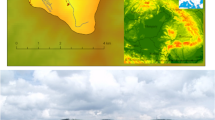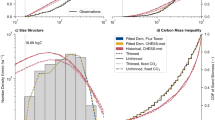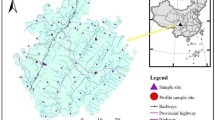Abstract
For several years a symptom referred to as ‘needle tip-burn’1–3 has been observed in Sitka spruce seedlings at the Forestry Commission Research Nursery, Sugar Hill, near Wareham, Dorset. The nursery, which occupies land formerly covered by Calluna and scrub pine, is on a highly leached sandy soil over Bagshot Sands (Lower Eocene), with a humus and iron pan at varying depth. To break the pan, most parts of the nursery have been subsoiled in recent years.
This is a preview of subscription content, access via your institution
Access options
Subscribe to this journal
Receive 51 print issues and online access
$199.00 per year
only $3.90 per issue
Buy this article
- Purchase on SpringerLink
- Instant access to full article PDF
Prices may be subject to local taxes which are calculated during checkout
Similar content being viewed by others
References
Crowther, E. M., Warren, R. G., and Benzian, B., Rep. For. Res. For. Comm. Lond. 1952/3, 84 (1954).
Benzian, B., Rep. For. Res. For. Comm. Lond. 1953/4, 38 (1955).
Rothamsted Experimental Station. Rep Rothamst. Exp. Sta. for 1955 (1956).
Jones, J. O., Nature, 165, 192 (1950).
Bould, C., et al., Nature, 165, 920 (1950).
Pizer, N. H., J. Roy. Agric. Soc., 116, 68 (1955).
Author information
Authors and Affiliations
Rights and permissions
About this article
Cite this article
Benzian, B., Warren, R. Copper Deficiency in Sitka Spruce Seedlings. Nature 178, 864–865 (1956). https://doi.org/10.1038/178864a0
Issue date:
DOI: https://doi.org/10.1038/178864a0
This article is cited by
-
Development of containerized Picea abies (L.) Karst. seedlings grown with heavy watering on various peat, perlite and mineral wool mixtures
New Forests (1987)
-
Besonderheiten im Ernährungszustand chlorotischer Fichten auf kalkreichen Böden
Forstwissenschaftliches Centralblatt (1970)
-
Copper deficiency in Douglas fir (Pseudotsuga menziesii (Mirb.) Franco)
Plant and Soil (1966)
-
Forest fertilization research, 1957–1964
The Botanical Review (1965)
-
Mangan- und Kupferernährung bayerischer Kiefernbestände
Forstwissenschaftliches Centralblatt (1961)



